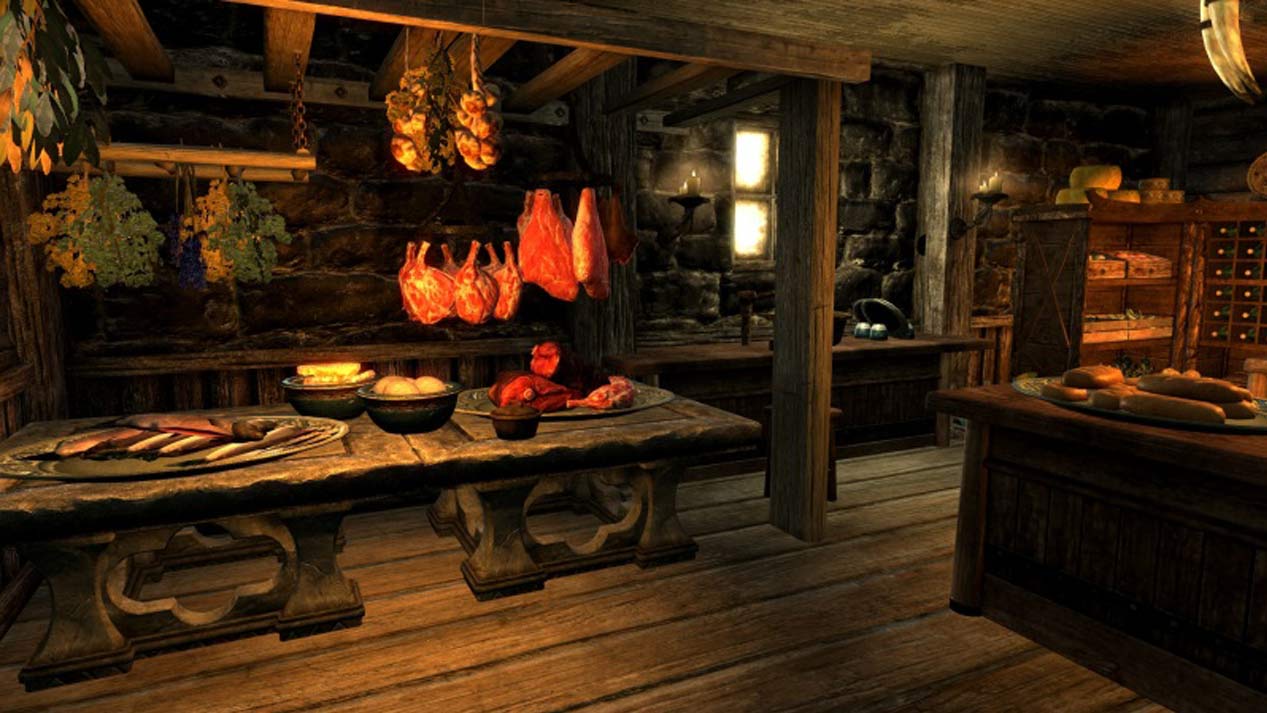When stepping into one of the many taverns and inns in Skyrim, all I want for my protagonist is to retire to a comfortable corner of the room.
1. Immanuel Kant differentiated in Observations on the Feeling of the Beautiful and Sublime the subtle nuances between that which is beautiful and that which is sublime. “Whereas the beautiful is limited, the sublime is limitless, so that the mind in the presence of the sublime, attempting to imagine what it cannot, has pain in the failure but pleasure in contemplating the immensity of the attempt.” The sublime carries an aura of mystery and possibility, and human beings remain awestruck amidst its presence. John Constable may paint a beautiful pastoral landscape, but to actually walk into a bucolic, serene meadow with remote mountains looming on far horizons bespeaks the greater wonder of sublimity.
Sublimity taps into our fascination with the infinite, evoking both the allure and potential incomprehensibility of grandiose sights beyond easy appreciation. To study the sublime grants the language of aesthetic qualities of things that stimulate the imagination. A breathtaking sight stirs within the viewer a sense of boundless prospect and freedom; this revitalized mindset shapes meaning, even if we’re momentarily overwhelmed with awe. The Irish philosopher Edmund Burke, writing in the context of 18th century Enlightenment, viewed the natural world as an essential paragon of sublimity’s magnificence and its transformative capacities. Stumbling upon an impressive, vast panorama of lofty mountain peaks capped with snow, verdant woodlands, and thundering waterfalls may grant the contemplative spectator a state of fear, awe, despair, bliss, and even intellectual enlightenment. This feeling transforms a plain mindset to one fortified with meaning. It suspends the vagabond over the precipice, spellbound to the far horizons.
2. When stepping into one of the many taverns and inns after journeying across the windswept plains and peaks of The Elder Scrolls V: Skyrim, all I want for my protagonist is to retire to a comfortable corner of the room and tuck into a satisfying dinner. One of the most fulfilling pleasures of the wintertime follows from here: to return from a frigid, exhausting day and welcome the cozy warmth and dimly lit familiarity of homespun lodging. In Skyrim, these taverns present an approximation of this nostalgia. Rustic wooden interiors softly lit with candlelight and populated with a scattering of fatigued travellers express a comfy space suitable for respite. Tables laden with Skyrim’s savory cuisine – pheasant roast, sliced goat cheese, Honningbrew mead, beef stew, spiced wine, grilled leaks, salmon steak, apple pie – surround an open hearth that breathes light and vitality to the setting. The stage is set and snug; my player-character hunkers down amidst the fire.
Something’s a bit off. The components of the scene fall into place, but everything feels hollow and artificial. Many taverns in the game remain standardized with one predetermined layout, betraying a sense of paltriness with the game’s interior design. The bards are also insufferably dreadful, robbing these locales of quiet serenity and believability. And why won’t my companion Lydia join me at the table and sit? She towers above with a moronic expression, oblivious as an AI to the human pleasures of leisure. I dream of video games that prioritize the modest activities of daily life, but I can only pretend to lounge and dine here. Amongst the “travelers” that really just remain rooted to their preset habitations, I navigate soulless menus and consume my dinner with utilitarian unimportance. There are no eating animations or pleasant small talk with passerby to be had here. As with most video games, Skyrim aligns you as the ultimate savior of the realm with no time for quotidian life. There’s no poetry here, just plainspoken, coldly functional mechanics and not a semblance of the artistry of inactivity. Lydia continues to stand, and my roleplaying patience is reaching its limits.

3. Instead of trekking directly to Whiterun at the start of the game, I wandered around. Ignoring the quest marker and the directions leading towards progress, I favored the archaic means of navigating by signs and passerby, occasionally straying from the path and curiously probing the roads less travelled. It’s the way to fully appreciate Skyrim. Boasting a stunning visual palette of earthy tones and frosted mountain panoramas, the game provides great incentive to simply explore its overland spectacle. So when a few hours into the game Skyrim reveals its propensity for insulating the player in cramped, monotonous dungeons and underground ruins, one comes to appreciate the sweet longing for aboveground vistas. Instead of beelining straight to Whiterun and every other major destination until the end of the main quest line, I embraced the desire for wanderlust. From a grueling, near lethal early run-in with flame atronachs and spriggans just half an hour into the game, the unexpected sight of the austere tundra plains of Whiterun bursting from between a narrow mountain pass proved absolutely sublime and mesmerizing.
4. Lacking a substantial, captivating main narrative and central characters, Skyrim compensates with its beautifully realised sensory ambitions. The allure of the game stems from the simple feel of movement, the pleasing sight of its landscapes, and the ethereal sounds of a ubiquitous score. Taken together, Skyrim occasionally transcends its narrative and structural flaws and becomes a genuinely therapeutic game to play. Therefore, while the game sometimes elicits a feeling of sublimity and boundlessness – as in the first sight of the plains surrounding Whiterun, mammoths silhouetted in the horizon – these feelings do not emerge as much as it should (and can). Skyrim devolves too often into generic video game territory, calling attention to its own artifice and pandering to a player-centric mentality instead of thoroughly investing in its realized environments. For instance, why can’t I unassumingly appreciate a passionate bard delivering the long lost King Olaf’s Verse without all eyes in attendance looking squarely at me? Why does the game insist that the Dragonborn fighting falmer and giant spiders is far more interesting than basking in the unworldly tranquility of Blackreach without repetitive, distracting combat?
Uncovering magnificent locales like Blackreach or Eldergleam Sanctuary would benefit greatly without Skyrim’s tiresome battle mechanics, allowing the game to take a moment of quiet repose and appreciate its own aesthetic accomplishments. I sometimes envisage Skyrim triumphing as a minimalist first person walker in the vein of Dear Esther or Eidolon, opening room for modest contemplation instead of devolving into fantasy action RPG territory. After all, when Constable or Turner painted sublime forms mired in abstruseness, they figured the potential for infinitude. Skyrim’s most accomplished, effective moments of sublimity emerge when one simply tilts the view skyward, gazing upon the unbounded sight of aurora borealis, lights shimmering in darkness.
5. Investing over sixty hours into Skyrim, the seeping understanding of the many limitations and drawbacks of the game become more apparent. The aforementioned tendency to isolate quest lines to underground dreariness instead of the game’s lush overland world is an obvious misstep. But even journeying around the game’s populated towns contains its disadvantages, such as encountering the world’s lackluster voice talent and unfortunate affinity for awkward Scandinavian accents. Moreover, places like Whiterun or Winterhold, though admittedly visually alluring, altogether lack the dynamism and charisma expected in populated towns. As in the uniform taverns throughout the game world, the more one spends time actually looking closely, the more one grasps the automaton nature of Bethesda RPGs and the underlying shallowness of its game worlds.

6. Perhaps the best analogy I can provide on the triviality of Skyrim and its world comes from its treatment of food and drink. Although I admire the game’s detailed engagement with these consumable wares (a great Kill Screen article on eating in Skyrim conveys the game’s success in whetting our gastronomic appetites), Skyrim fundamentally marginalizes the act of dining as utilitarian in the service of combat. The great fabulist Aesop quipped, “Better beans and bacon in peace than cakes and ale in fear,” so why is it that I always seem to be eating in Skyrim to replenish my health in battle than to actually sit down and dine like a normal human being? The act of resting and eating lacks anything resembling homely comforts; it’s an apathetic, automatic activity executed through menu screens than portrayed in reality. All this is done in the service of pandering to cold functionalism over the simple pleasures of meaningful mechanics. Comparable AAA games like Red Dead Redemption at least depict its protagonist reposing amidst a small campfire, and playing Bethesda’s own Fallout: New Vegas contains the invaluable hardcore game mode wherein cooking and eating remain essential to overall well-being. Here, the basic actions of everyday life and all else in the game feel completely divorced and awkwardly un-substantiated. My Dragonborn doesn’t eat dinner in this game; he downs six cheese wheels in battle and looks like an idiot doing so.
7. After a long day enduring mindless combat and occasionally spying transcendent panoramas that illustrate why I bother in the first place, I long for those better beans and bacon in peace upon stepping foot in a snug tavern. Although I know I won’t achieve the satisfaction of the real comforts of rest and supper, I roleplay anyway, navigating menus and engaging the robotic exchanges of this tavern’s occupants. I buy some venison chop, baked potatoes, Honningbrew mead, and honey nut treat. The bard sings in the corner; the fire crackles. A table glowing by the hearth beckons me closer, murmuring the promise of warmth and relaxation. Rest your weary legs. Lydia will stand.






